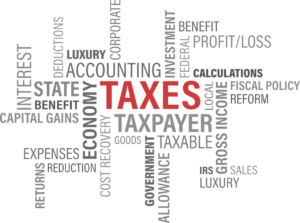Have you ever wondered what the requirement for “economic substance” in our St. Lucia context is all about?
Why economic substance?
Over the years, offshore countries like St. Lucia, have attracted business by offering low or no-tax to international businesses incorporated under its laws. However, these countries have been singled out for enabling “base erosion and profit shifting” strategies. This is said to facilitate corporations moving profits from the country where the income is generated to “tax havens” where it has little or no economic activity. The effect is the erosion of the tax base of the country where the income is generated.

In response to these international concerns, St. Lucia has amended tax laws and introduced economic substance legislation.
What is economic substance?
Economic substance is the requirement that “relevant entities” show a link between the income which they generate and the activities that they carry out. When such a link exists, relevant entities enjoy tax benefits, that is, an exemption on foreign source income.
Which entities are affected?
For an entity to qualify for an exemption on foreign source income, that is, income accruing from a source outside of St. Lucia, it must first be a relevant entity.
Generally, this means that it must be either, a St. Lucia international business company, a limited liability partnership or external company registered under our laws or, an international trust. The entity must also carry-on economic activity in a “relevant sector”.
A relevant sector is defined as “a sector in which an entity carries on economic activity in St. Lucia” as listed under the Schedule, as follows:
- Banking business.
- Insurance business.
- Shipping
- International mutual funds business.
- Financing and leasing.
- Headquartering
- Activities of a company holding tangible assets.
- Activities of a company holding intangible assets.
- Activities of a pure equity holding company.
- Distribution and service centre business.
- A combination of a business or activity carried on under paragraphs 1 to 10.
Therefore, a St. Lucia entity that carries out activities, whether wholly or in part, in any of the above relevant sectors is a relevant entity and is subject to economic substance requirements.
What are economic substance requirements?
Pure equity holding companies are entities which hold only equity participations and earn only dividends and capital gains. They are only required to meet reduced economic substance requirements. Generally, therefore, they are required to show evidence of adequate human resource capacity for holding and managing its interests in St. Lucia and must make all required statutory filings.
All other relevant entities must satisfy the economic substance test. They are required to:
- be directed and managed in St. Lucia, as explained further below;
- have an adequate number of qualified employees in St. Lucia, whether —
- employed by the relevant entity or another person, or
- employed on a temporary or long-term contract;
- have expenditure and physical presence; and
- conduct their ‘core income generating activities’ in St. Lucia, as explained further below.
Directed and Managed in St. Lucia
To be considered “directed and managed” in an appropriate manner in St. Lucia, this requires:
- the company’s board of directors to meet in St. Lucia at an adequate frequency given the level of decision-making required;
- a quorum of directors to be physically present at each meeting of the board of directors;
- strategic decisions of the company are to be set at meetings of the board of directors and minutes of the meetings are to reflect strategic decisions;
- the board of directors as a whole, must have the necessary knowledge and expertise to discharge its duties as a board; and
- the minutes of the board meetings and the company records are to be kept in St. Lucia.
Core Income Generating Activities
Core income generating activities are the key essential and valuable activities that generate the income of the entity. Each relevant entity must engage in core income generating activities associated with its relevant sector, as outlined in the legislation and guidelines.
One or more of the activities listed must be performed in St. Lucia in order for the relevant entity to meet the economic substance requirement. Where there is a combination of relevant sector activities, the relevant entity must show evidence of economic substance in relation to each activity.

Reporting requirements
An economic substance return must be submitted (electronically) three months after the year of income of all relevant entities. The elements of the economic substance return are as follows:
- address and location of its registered office and place of operation, whether leased, rented or owned, in and outside of St. Lucia;
- name and jurisdiction of residence of the beneficial owners;
- number of full-time employees or other personnel with appropriate qualifications, including contracted third parties, who are in St. Lucia;
- amount and type of income earned in respect of each relevant sector;
- amount and type of expenses incurred and assets held in respect of each relevant sector;
- detailed description of its core-income generating activities undertaken in St. Lucia;
- statement of whether it considers that the mind and management in the relevant sector in St. Lucia is within the meaning of subsection (4), and if so, to provide evidence.
What are the penalties for non-compliance?
There are several penalties for failure to comply with requirements for economic substance. Entities that fail to meet the reporting requirements, fail to provide information, or willfully or knowingly supply false information will be subject to financial penalties. Continuous non-compliance will result in the relevant entity being struck off the register. Furthermore, the Competent Authority (the Revenue Authority) may disclose all information of non-compliant entities to partner jurisdictions.
Looking ahead
The economic substance requirements in St. Lucia reflect the country’s commitment to complying with international standards. While these regulations may pose challenges for some businesses, they are a crucial step in ensuring that entities operating in St. Lucia engage in genuine economic activities within the country.
Therefore, entities considering St. Lucia as a jurisdiction for their operations should carefully assess and comply with these economic substance requirements to ensure legal and financial compliance.
Prepared by Geoffrey DuBoulay, Partner and Laurène Abboud, Associate
FLOISSAC, DUBOULAY & THOMAS provides this information for educational purposes only. It should not be construed or relied on as legal advice or to create a lawyer-client relationship. This guidance note is not intended to be, and should not be construed as, legal advice for any particular situation and you should not act upon this information without seeking advice from a lawyer. If you have any questions, please feel free to contact us at info@fdt.law.
